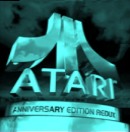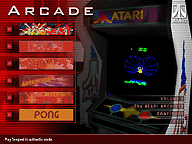
As gamers
of a certain age have grown increasingly fond of the games of their youth, many
companies are looking to capitalize on this trend by releasing compilations of
classic games for newer systems. Of course, you canít talk about gamingís
golden age without mentioning Atari, the dominant force at the genesis of the
electronic gaming era. As you might expect, despite the years that have passed,
there are still many bright memories of that time in history. The Laser looks at
Infogramesí Atari Anniversary Edition for the Dreamcast and Playstation to see
if it lives up to the memories.
Classic
game compilations have become increasingly popular in recent years with many
gamers drawn to the simple yet still addictive games of their youths. Infogrames
joins the trend by taking advantage of the Atari name and the 30th
anniversary of its founding in 1972 by bringing out Atari Anniversary Edition
for multiple console systems, with each pack offering a fantastic time capsule
of days gone by. Whatís really good about many of the recent packs is that
theyíre emulated perfectly and feature the games almost exactly as they
appeared in the arcade. You can even turn the original arcade game on and off
during the game. Most of the games on AAE are undeniable classics, but there are
also a few lesser-known gems included in each to round out the collections and
make them more appealing for the hard-core gamers. As you might expect, the
games are fairly limited with primitive graphics and sounds, but anyone that
grew up with these game wonít mind this at all. The Dreamcast edition features
11 faithfully reproduced games: Asteroids, Asteroids Deluxe, Battlezone,
Gravitar, Crystal Castles, Centipede, Millipede, Missile Command, Pong, Super
Breakout. Tempest and Warlords. While most of these titles are well-known, there
are several games which havenít gotten as much of the spotlight as they
deserve.
Everyoneís probably familiar with Asteroids, and itís still a solid game
with the same simple and addictive gameplay youíve come to know and love over
the years. Asteroids Deluxe on the other hand, is a much improved version of the
classic Ė the rocks now spin around, a shield is introduced but the biggest
twist are the clusters of enemy fighters which you can break apart and that
subsequently attack you. This is really cool and makes things much more
exciting. Gravitar is another lost classic, one that never got the attention or
praise it deserved back in the day. A super cool vector game, this is incredibly
challenging and difficult. Players start on a starfield with smaller objects
they can fly into, and the mini-games scale up. There are several of these, the
main object is to fly the ship and destroy without hitting the walls. This
sounds easy but Gravitarís physics mean that you have to contend with the
gravitational pulls. Itís not simple, since you have to compensate for this,
and requires a great deal of skill, making this incredibly difficult to beat yet
quite satisfying when you do. Crystal Castles in another oddity, with its
strange 3D graphics and cute characters itís also another game that doesnít
get the respect it deserves, since itís a lot of fun and the multiple maze
layouts are quite challenging.
As for the other games, they hold up quite well for the most part, with the
cerebral play, minimalistic green vector graphics of Battlezone retaining a lot
of appeal. Tempest is still fantastic as usual, but this edition is also cool
enough to include Tempest Tubes, which replaces the standard shapes with more
elaborate geometric patterns yet keeps the same timeless gameplay. This was
originally a conversion kit for the arcade game and as such wasnít as widely
available or popular as it deserved to be. Missile Command probably needs little
introduction, but some who think of older games as slow, easy and dull should
play this, reach the latter levels and then complain about the lack of speed and
challenge. Players whoíve grown up on the 2600 edition might be shocked to see
how much better visually Warlords was in the arcade, especially when you turn on
the background art, which makes all the difference. For you younger gamers,
essentially Warlords is Pong meets Breakout with the added fun of having four
players compete on the same screen. Whatís also cool about this is that you
can hold the ball and unleash it on opponents. I really liked this version the
best out of all the versions, and no, it doesnít suffer as much as youíd
think without the paddle controllers. Speaking of Breakout, this is included as
well, though the Super edition is much more entertaining since there are
variations with locked balls, advancing rows of bricks, multiple balls and more.
I remember playing the 5200 version for hours and while it seems under-rated
these days, thereís still plenty of fun left. Centipede and Millipede are
included in this edition as well, though to be honest, the simpler play of
Centipede has more appeal than the cluttered Millipede, though this is a matter
of personal taste. Finally, we come to Pong which is the one that started it
all. Pong still quite enjoyable and the hypnotic gameplay can be surprisingly
addictive when youíre in the right move, and the controls in this version
arenít half-bad. So overall, thereís an excellent selection of games in this
compilation, and DC owners should pick it up.
The
PS1 version is called Atari Anniversary Edition Redux and is almost identical to
the DC edition except it drops Crystal Castles and Millipede in favor of Space
Duel and Black Widow. This is cool since neither have ever appeared in official
home versions until now. Itís a good trade, since while these two are somewhat
obscure, theyíre both excellent games. At first, you might think Space Duel is
just Asteroids with color vectors and more interesting graphics, which it
essentially is, the same sense of gravitational pull and similar gameplay seem
to make it feel quite derivative. However, the twist here is that two-players
can play at the same time. This doesnít seem like a big deal, but the two
ships in Space Duel are tethered together and can be used to fire in unison.
This makes the gameplay all the more interesting, making this a worthwhile
addition. However, the real treat in the package is Black Widow a true lost
classic with addictive gameplay and a really cool concept. You are a spider in
this one, and the object here is to shoot all the enemies that come at you,
collect the spikes. You also need to keep track of your web, since the lines
change color, and you canít pass through them when theyíre red. The game is
absolutely brilliant, it looks like Tempest, but plays a like a cross between
Robotron and Centipede with a bit of Galaga thrown in, making Black Widow feel
completely original. Itís highly addictive and the vector graphics in this
game are particularly impressive. This is a really awesome game, though itís
also one that seemed lost in the winds of time, so it resurrection after all
these years is particularly gratifying. Black Widow is so good, itís worth the
price of the entire compilation alone, especially for those who remember this
from way back when.
 In addition to the
games outlined above, both compilations feature an extensive archive section
where you can look through classic Atari memorabilia and other items, as well as
an in-depth interview with Atari founder Nolan Bushnell which is quite
interesting on its own. This is well produced and comprehensive making it
must-viewing for any video game history fan. The emulations themselves are of
excellent quality, and are highly faithful to the originals down to the smallest
details. Players can play with or without the original cabinet artwork, set the
difficulty and number of lives and also in some games, select bonus levels. More
importantly, you can change the image resolutions depending on what your
monitor/TV can display, which makes a huge difference in the vector graphics
titles, which look so-so at lower resolutions but excellent at the highest
levels. You can also change the size of the images for bigger or smaller
appearance as well. One of the cool features in the game is that players can
also use Nykoís cool classic Trackball controller on the PS1 version which
adds a lot of authenticity to the proceedings. Both of these packs are also
excellent buys in comparison to the relatively slim offerings on other
compilations, and give about as comprehensive overview of Atariís early 80ís
golden age as can be expected with commercial packages. Both are highly
recommended and remind players that these games arenít museum pieces because
theyíve aged quite well, and their addictive qualities have retained much of
their appeal even after two decades of increasingly complex titles. Far from
being nostalgia, both versions of Atari Anniversary Edition are fantastic
because they reminds players that outstanding play remains the most important
element in any game then and now.
In addition to the
games outlined above, both compilations feature an extensive archive section
where you can look through classic Atari memorabilia and other items, as well as
an in-depth interview with Atari founder Nolan Bushnell which is quite
interesting on its own. This is well produced and comprehensive making it
must-viewing for any video game history fan. The emulations themselves are of
excellent quality, and are highly faithful to the originals down to the smallest
details. Players can play with or without the original cabinet artwork, set the
difficulty and number of lives and also in some games, select bonus levels. More
importantly, you can change the image resolutions depending on what your
monitor/TV can display, which makes a huge difference in the vector graphics
titles, which look so-so at lower resolutions but excellent at the highest
levels. You can also change the size of the images for bigger or smaller
appearance as well. One of the cool features in the game is that players can
also use Nykoís cool classic Trackball controller on the PS1 version which
adds a lot of authenticity to the proceedings. Both of these packs are also
excellent buys in comparison to the relatively slim offerings on other
compilations, and give about as comprehensive overview of Atariís early 80ís
golden age as can be expected with commercial packages. Both are highly
recommended and remind players that these games arenít museum pieces because
theyíve aged quite well, and their addictive qualities have retained much of
their appeal even after two decades of increasingly complex titles. Far from
being nostalgia, both versions of Atari Anniversary Edition are fantastic
because they reminds players that outstanding play remains the most important
element in any game then and now.

